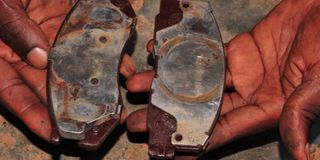Safety :Replace your brake pads in time

Worn out brake pads. These are dangerous. PHOTO BY MICHEAL KAKUMIRIZ
We all have been down that road where the mechanic ever hands you a lengthy list of needed repairs on your car that added up to more than Shs1m involving parts you did not even know existed and were not making any noises. Here is very good news, not all the maintenance recommended by mechanics is necessary. A huge amount of service can be safely ignored for a time. After all, no 10 to 20 year old car is going to be as trouble-free as a brand-new car.
Be informed
It helps to be an informed motorist and to know priorities. If you never want to be stranded on the roadside, then your repair costs will be significantly higher than if you accept a modest risk that the car will break down eventually, but not immediately. It should be no surprise that the number one safety item on your car is the braking system. If your mechanic warns you that your disks or drums are below minimum thickness, that your pads or shoes are worn down or that your hydraulic system is leaking, get it fixed immediately.
See, stop-and-go driving including highway driving, driving in rough terrain or carrying loads can severely shorten the lifespan of your brake pads. Mix all or some of them together and your brake pads (particularly the fronts, since they get the most use) will usually be worn quicker than you might imagine.
Doing it at the right time
Knowing when to change brake pads should be a critical aspect of your everyday driving knowledge. Heavily worn pads can have an adverse effect in slowing a car down to a halt and, if left unattended, the results can be potentially life threatening, especially in situations that may require a quick reaction.
As a conscious driver, it is vital that you make yourself aware of the tell-tale signs of excessive brake pad wear. As much as good driving relies on the coordination of our hands and our eyes, it is also important to make good use of your ears and to listen for unusual sounds or noises coming from your car. A squealing or grinding sound when slowing down your car is a clear sign that your brake pads have seen better days and a new set should be fitted without delay.
New technology
Fortunately modern cars and modern brake pads are virtually all equipped with audible wear sensors. Basically, once worn, the pads will emit healthy squeals, and not only when the brake pedal is depressed.
Nip it in the bud
The squawking and squealing will go on continuously, which is your key to getting the pads replaced soon. If you do not, then the rotors will eventually be destroyed.
What was a routine and inexpensive brake job then becomes costly. Other signs include brake warning light coming on, your car pulling to one side when braking instead of stopping in a straight line, brakes grinding with continuous loud metallic noise when applied, brakes having to be pumped to work properly or the brake pedal having to be pushed all the way down. You may never think twice about your brake pads until it is too late. Do not let that happen.




